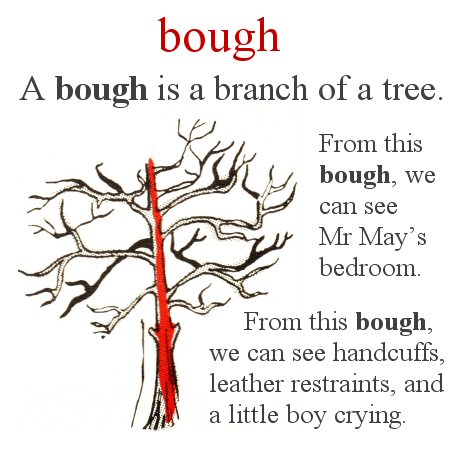
bough [bou] ExamplesWord Origin noun
- a branch of a tree, especially one of the larger or main branches.
Origin of bough before 1000; Middle English bogh, Old English bōg, bōh shoulder, bough; cognate with Old Norse bōgr, Dutch boeg, German Bug, Greek pêchys, Sanskrit bāhu Related formsbough·less, adjectiveun·der·bough, nounCan be confusedbough bowSynonym study See branch. Related Words for boughs sprig, shoot, fork, sucker, offshoot, limb, arm Examples from the Web for boughs Contemporary Examples of boughs
Deck your halls instead with boughs of holly, shouting “Merry Christmas” (or “Happy Hanukkah”) well into the night.
A Field General in the War on Christmas
David Freedlander
December 24, 2014
Historical Examples of boughs
We heard the swish of the boughs, heavy with new snow, and then silence.
Mary Austin
I tried to shake off the feeling of desolation as I went to my bed of boughs.
Dillon Wallace
Other boughs sagged under the weight of silvery cornucopias.
James Lane Allen
Just beneath at the first forking of the boughs a candle burned.
James Lane Allen
How steady it was as it moved among the boughs, extinguishing the lights.
James Lane Allen
British Dictionary definitions for boughs bough noun
- any of the main branches of a tree
Word Origin for bough Old English bōg arm, twig; related to Old Norse bōgr shoulder, ship’s bow, Old High German buog shoulder, Greek pēkhus forearm, Sanskrit bāhu; see bow ³, elbow Word Origin and History for boughs bough n.
Old English bog “shoulder, arm,” extended in Old English to “twig, branch” (cf. limb (n.1)), from Proto-Germanic *bogaz (cf. Old Norse bogr “shoulder,” Old High German buog, German Bug “shoulder, hock, joint”), from PIE *bhagus “elbow, forearm” (cf. Sanskrit bahus “arm,” Armenian bazuk, Greek pakhys “forearm”). The “limb of a tree” sense is peculiar to English.
 Liberal Dictionary English Dictionary
Liberal Dictionary English Dictionary